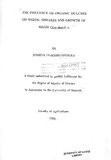| dc.description.abstract | Effects of three organic mulches with two intra-row weeding,
conventional tillage with two hand weeding and an unweeded check
on maize (Zea maysL.) growth, weeds and diseases associated with
the maize crop were evaluated for two seasons. The experiment
was conducted during the long and short rains of 1989 at Kabete
Farm, University of Nairobi, Kenya.
During the long rains, the organic mulches proved more
effective in controlling annual weeds than the conventional
tillage with hand-weeding. Better trends in weed control were
registered during the short rains, although the conventional
tillage with hand weeding showed superiority over the organic
mulches. Maize stover mulch was found to be less effective in
controlling Bidens pilosa L. and Commelina benghalensis L.
compared to bean husks. However, stover was superior to bean
husks in controlling Oxalis latifolia H.B.K. and Oxalis
corniculata L.
Better crop growth was obtained during the short rainy
season compared to that in the long rainy season. This
corresponded well with the excellent weed control exhibited by
the organic mulches except for the stover which had inferior .;J
plants during the long rains.
Crop stand, at harvest, during the short rains was superior
to the long rains. All the treatments, except the unweeded
check, had equally good stands during the short rains. During
the long rains, conventional tillage with hand-weeding had the
best stand, with bean husk and black polythene mulches at par.
The unweeded check registered the least cob length, one thousand
grain weight and grain yields during both seasons. The maize
stover mulch resulted in very low grain yields during the long
rains. However, its yield was comparable to that of black
polythene during the short rains. The bean husk treatment gave
consistently good yields during both seasons and even proved
superior to the other two mulches during the short rains.
Maize stover mulch proved to have significant influence on
incidence of northern leaf blight of maize. Plants in the maize
stover plots attained 100% incidence level only six weeks after
emergence compared to eight weeks after emergence in the other
four treatments. However, the high incidence of this disease
seems to have influenced grain yields in the stover mulched plots
only. | en |

